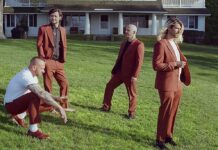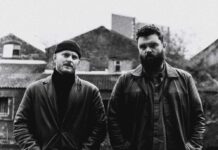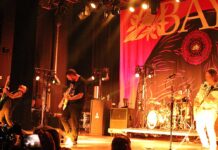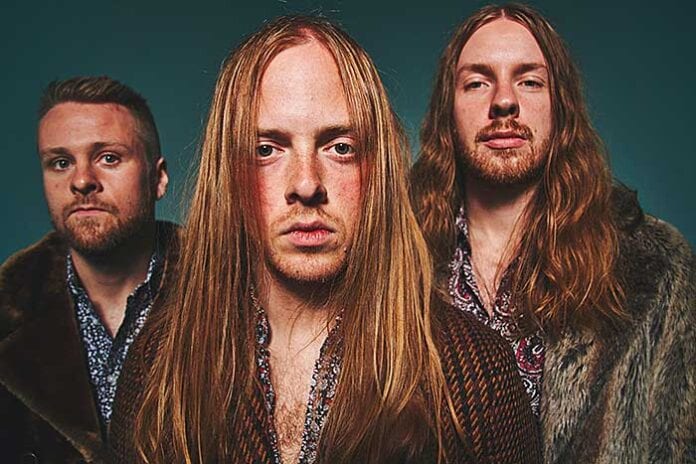
INTERVIEW WITH ÓSKAR LOGI ÁGÚSTSSON
BY KEVIN STEWART-PANKO
PHOTOGRAPHS BY HÖRÐUR SVEINSSON
Coming off a triumphant album cycle for 2018’s Gateways that saw the finest power trio from the suburbs of Reykjavik tour the Old World as headliners, then as direct support to Opeth, 2020 was originally designed to keep the momentum churning with a new album, a new deal with Napalm Records, and more bolt loosening and scaffold rattling as they conquered stages here, there, and everywhere.
It’s an increasingly tired and frustrating story, but we all know what happened to anyone who had plans to do anything in 2020. Still, with the high-octane and infectious psychedelic/progressive hard rock of Monuments, The Vintage Caravan has shone a kaleidoscopic light on dark and cloudy times.
The band’s fifth album may touch on a variety of elegiac and morose personal topics, but it’s all done while blasting out from under a veneer of hip swinging, bell bottom shaking, mop topped rock that filters your weird uncle’s dusty tie-dye T-shirt and classic rock vinyl collection through a flux capacitor bookended by the Woodstock Festival on one end and Mastodon and High on Fire on the other. We caught up with guitarist/vocalist Óskar Logi Ágústsson for a primer on volcanic activity, Icelandic rock history, and how to never forget your roots even when you inadvertently neglect them.
How close are you to the Fagradalsfjall volcano that’s been erupting over the past few weeks?
I’m about 40 kilometers or so away. Actually, just today another source of lava emerging from the ground opened up, so I think there are two or three sources happening, woo-hoo! (laughs) But it doesn’t really affect us. It’s very much a “showcase volcano,” as they say. It’s not like the Eyjafjallajökull from 2010, which was the one that stopped all the air traffic. It’s been pretty crazy. People have been hiking up to see it, getting right up to it, and using frying pans and cooking their bacon on the lava. It’s pretty ridiculous, but it’s funny and a nice little distraction for the Icelandic people especially since now we’re in another wave of COVID cases. It was pretty clear back in the summer. We went about three months with zero cases and for a while you barely ever heard about it on the news. Concerts came back and everything, and we even managed to play four shows. It was good to get back to normal a little and it was great while it lasted.

From where you are, can you hear, feel, or see the volcano?
I can see it. If you find a good hill, you can see red glowing in the distance. It has a Mordor kind of feeling to it and it’s pretty cool. We’re definitely going to get some promo pictures out of this volcano, maybe some selfies for our social media and that kind of stuff (laughs).
“YOU CAN SEE RED GLOWING IN THE DISTANCE. IT HAS A MORDOR KIND OF FEELING TO IT AND IT’S PRETTY COOL.”
The Vintage Caravan is obviously rooted in classic and progressive hard rock from the 60s and 70s, like Rush, Deep Purple, Cream, Zeppelin, etc. Outside of those imported influences, is there a homegrown prog/hard rock history in Iceland that inspired you?
Of course, me being born in 1994, I can only go from what I’ve heard and what I’ve learned in being a little bit of a music history nerd, but in Iceland there was always an interest in that sound and those bands. In 1965, the Kinks came to Iceland and they were the first sort of Beatles band that came to the county, and when Led Zeppelin came in 1970, that changed everything. There are a lot of great Icelandic bands from the 60s and 70s that were making incredible albums. Actually, one of my favorites is Lifun by Trúbrot. That’s from 1971 and probably my favorite album of all time. We performed it in its entirety with an original member of the band back in 2015. That was an amazing night and one of the highlights of my career. But, there was a lot of obscure rock that made it from the island. There was a band called Ice Cross that I highly recommend people checking out. They have an album from 1973 and it’s proto heavy metal. It’s so heavy and weird, the tonal choices they made were so bizarre and I don’t even know what scales they were using. They’re one of those bands that have a cult following. I also hear from other people that when they got mail order catalogs from labels in the 80s and 90s that they had no way of checking or knowing if an album was any good. They’d just look at the cover and be like, “Okay, let’s give it a shot.” They’d order it, four months later they’d get it, and you’d either love it or hate it. I collect vinyl and find a lot of badly damaged old records and I think what happened is that someone took a lot of time and money to order an album back in those days, they got it and it sucked, so they took a key and just fucked up the album out of pure anger. It sucks, but I get it. I have a few great albums that are completely destroyed probably by some angry guy out in the countryside or something (laughs).
As rich a history as Iceland has in all aspects of the arts, with such a small population it must be next to impossible to make a living as a musician, author, etc.?
It is interesting and it was definitely more difficult back in the day. I think one of the reasons why there are so many artists coming from so many fields in Iceland is that the lack of sunlight during the winter drives people to do some sort of art. You have to express that in some way, whatever it is. It’s one of the tools that helps you through being where we are on the planet. But also, a lot of the artists aren’t really going for what’s hip or popular or what’s going to make money because you can’t really “make it” when you live in Iceland. If you do your own stuff and live here, you have to have a job as well. But that’s one of the reasons the music is very unique, like Björk and Sigur Rós, because you make what you want to hear without chasing what’s in at the moment. It’s people just doing what they want to do, however weird it is. If you want to make an album about speaking to elves, in Elvish, then do that, you know? But it was interesting because we hit the scene at a nice time when all eyes were on Iceland from 2009–2014. It was a period when so many talent scouts and industry people were coming to Iceland and picking up bands, and we were in that batch. We came up at a good time for sure. If it would have been 10 years prior, it would have been way more difficult and we probably would have never left the island.
“ONE OF THE REASONS WHY THERE ARE SO MANY ARTISTS COMING FROM SO MANY FIELDS IN ICELAND IS THAT THE LACK OF SUNLIGHT DURING THE WINTER DRIVES PEOPLE TO DO SOME SORT OF ART.”
Are Icelanders ever surprised that the weird stuff is able to connect with people in other parts of the world?
For sure. You hear it from a lot of Icelandic bands about how they made this just for me or themselves and didn’t expect anyone to latch on to it, especially someone living in California, for instance, who’s listening to dark music about shit that happens here. I guess the music brings you to the place where it was spawned from and that’s one of the beautiful things about music. If I listen to the Grateful Dead, I feel like I’m in San Francisco even if I’ve never been there. It has that ability to transport you to wherever it came from.
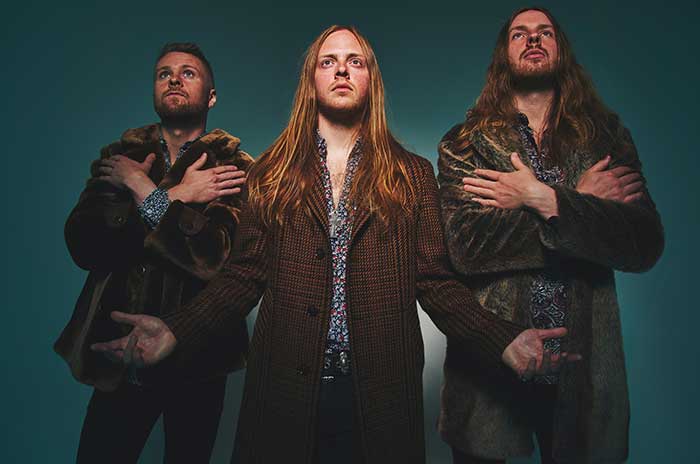
Like many people throughout the pandemic, I’ve been watching a lot of Netflix where I discovered Icelandic crime-thriller shows like Trapped and Case, as well as comedian Ari Eldjárn’s special. Have you had more people asking about other aspects of Icelandic culture instead of the usual ones like Björk and Sigur Rós?
Yeah, Ari Eldjárn’s special was a great achievement for an Icelander and a great special. But, not a lot of people have been asking about other figures all that much, really. Sometimes I get people asking a little bit about the black metal scene because it was really booming for a while and it really caught on. It’s not like anyone has asked me about Halldór Laxness.
Who? Wasn’t that an album by hardcore band Mínus?
Yes, but Halldór Laxness was the only Icelandic person to have won a Nobel Prize for literature. Ari Eldjárn touches on that in one of his bits where he talks about how in literary achievements per capita, we’re on top of the world, but it’s still mostly the obvious ones that get brought up and who people ask about.
“WE SET OUT ON MAKING THE MOST PERSONAL ALBUM WE COULD AND THE BEST ALBUM WE COULD”
With regard to Monuments, when was it written, how far back does the material go. and was any of it affected by COVID?
It was recorded in February and March 2020, just before shit hit the fan. So, it’s a pre-COVID album, but a lot of the lyrics I feel match the atmosphere that came later in the year and for some of them I even like the new meaning they’ve come to have. Overall, the album came together really quickly, because it had to. I write a lot of stuff and [bassist] Alexander [Örn Númason] does as well, so there was a lot of stuff laying around, but not a lot of concise pieces of music. We had three songs finished in October of 2019 and we entered the studio in February. We spent so much time together right after the Opeth tour working on new material. We set out on making the most personal album we could and the best album we could because I don’t see a point in making another album if it’s not the best thing we’ve done. We’re always progressing with our stuff and I’m super proud of the album. Because of the COVID situation, we had a lot of time to mix it and take our time with that process. It was also a very weird mixing process. We were all in different places and we were mixing it via email and a few phone calls. If I wanted to hear a little bit more echo on this part of the vocals or something, I’d get it back five days later and I’d be like, “Nope, that was a mistake. Change it back.” That slowed things down and there were 27 mix notes, which I think was the final number we finished with. But the best thing about that process is that the album sounds great in different platforms, like in the studio and my speakers at home, and if it sounds great on different devices, we’re on to something.
After being on tour with Opeth and heading straight into writing, was the album impacted by a carryover of live energy?
Probably subconsciously. For the most part, the fewer things that are between me and making something that is exciting for me, the better. If I start to overthink things, it starts to suck the joy out of it. It’s normally the first version of the thing you made is what ends up on the album because it’s exciting and you’re putting it together. On this album we let the songs be what they wanted to be. Sometimes in the past we shied away from doing stuff with a pop sensibility and felt we had to put in a 7/8 time part just to fuck things up or de-pop it. This time we just let things be and found that good balance between being musically intricate and demanding and being a little bit complicated, but overall still having a pop sensibility and those hooks—finding the balance between Gentle Giant and ABBA (laughs).
“EVERY SONG ON THE ALBUM IS A MONUMENT OF ITSELF AND REPRESENTS A TIME IN OUR LIVES.”
With the album sitting around for much of a year, did you have to fight the temptation to go back and endlessly tinker with it?
I wouldn’t say so. We were all at a place where we were just like, “This is just ready. This is what it is.” We’re all perfectionists, but we know when to stop and let the thing be what it is. There are a lot of takes where there’s guitar stuff I know I can play better, but I went in with the mentality that if the feeling is great then it’s okay if it’s a little sloppy here or there. And at the same time, it’s mostly stuff that only I can hear because I knew what I was striving for. If there’s a great vibe to a take, I prefer that over being super clean and 100 percent accurate. But it’s really hard because you want to be perfect, but sometimes you have to hold off to maintain that vibe.
What’s the story behind the album’s title?
When we were talking about album titles, both Alexander and [drummer] Stefán [Ari Stefánsson] had the word Monuments on their list, which was kind of weird. We’re not really sure where that came from, but they both liked that concept and I did as well. How I see it is that every song on the album is a monument of itself and represents a time in our lives. As I said earlier, it’s also a really personal album and there’s stuff in there that we would have maybe shied away from on earlier albums that we allowed on this one. For example, the song “This One’s For You” is about my brother who passed away in 2018, and it was a very cathartic experience doing that. There’s also the closer “Clarity,” which is very personal for Alex and it was his baby the whole way. It was interesting to open up in that way—scary but fun as well.
With a year off the road and doing things differently from how you’ve done things for a decade, what do you feel you’ve learned about yourself and band?
That’s a good question. It’s hard to say. I don’t know. A lot of people are using this time to reflect, but I feel like myself when we’re touring, doing what we want to do, and connecting with people, so it’s hard to say I’m reflecting on who I am because I don’t feel this is who I am at all. It’s bizarre, but at the same time I’ve got a dog now and I found out that I like this dog, which is very good for the dog (laughs). I’ve been doing a lot of self-care stuff, keeping in shape, going hiking, and there are a lot of nice mountains around. I’ve always liked being active, but I’ve especially figured that out during these times. I have a lot of energy and it’s good to find other ways of handling that. Normally, if I play a show I leave everything on the stage. I also realized that I really like Tetris and playing internet Scrabble. I’ve spent way too much time doing that (laughs).
“ICELANDIC PEOPLE ARE A LITTLE BIT USED TO AN ISOLATED LIFE, BUT NOT USED TO IT LIKE THIS.”
With all the regular challenges facing Icelanders in terms of geography, climate, isolation, winter darkness, and so on, have people been prepared for pandemic restrictions or has there been a mental health crisis in Iceland as in most other places?
There’s been a huge increase in domestic violence, which is scary. There have been two murders here this month which is very, very bizarre, though I don’t know if that’s connected in any way. But definitely, there aren’t a lot of people I know who are super happy with the situation as it is, even if everyone is managing in their own ways. Icelandic people are a little bit used to an isolated life, but not used to it like this. I’m not sure if we’re more capable of dealing with it or not. There have been times when there have been big snowstorms and we’ve had to stay indoors for days at a time. Maybe something like that has prepared us a little bit more, but I can’t say for sure.
If you were to not worry about playing proper venues, not worry about who’s in the crowd, and bite the bullet on a lot of common touring amenities, would you be able to pull off some sort of an Icelandic tour?
Yeah, I guess you could do at least 10 days. Outside of Reykjavik there are three places big enough in which you could frequent, and I know there are bands that do these kinds of tours. There used to be a really big country ball scene where bands would play every small town and people would come out from all the smaller towns in a 40 km radius and everyone would just get shit faced drunk while the band played popular tunes and that sort of thing. That started in the 60s, went to the early 2000s, and just kind of stopped. There’s a part of me that wants to bring that back and play all those ballrooms around Iceland because there are some really cool places out there. We even recorded [2015 album] Arrival in one of those ballrooms, which was a very interesting experience, but I think it would be fun to bring that back and focus on Iceland because we sometimes neglect our home country.









